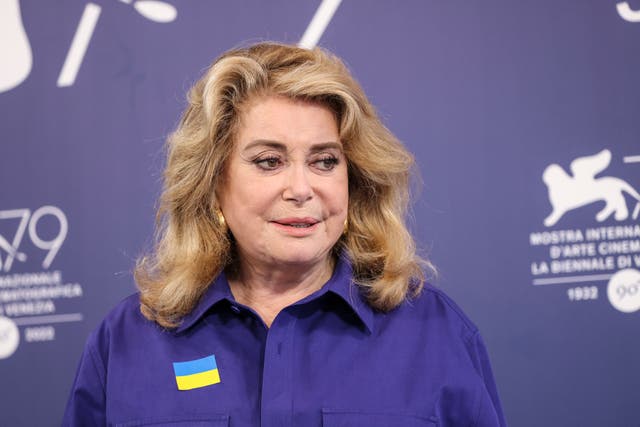
Catherine Deneuve, the queen of French cinema, remains an icon of timeless beauty and unparalleled talent even at 81. A woman of mystery, strength, and elegance, she has shaped the world of film and fashion for over six decades. But behind her mesmerizing performances and poised public image lies a life filled with passion, rebellion, loss, and resilience.
As she steps into her ninth decade, what has truly defined her journey? What are the secrets behind her legendary status? And what does she look like today?
A Star is Born: From Family Tragedy to Cinematic Glory
Born Catherine Fabienne Dorléac on October 22, 1943, in Paris, Deneuve was destined for the spotlight. Raised in an artistic family—her father, Maurice Dorléac, was a stage actor, and her mother, Renée Simonot, was a voice actress—Catherine and her sisters were immersed in the world of performance.
Her older sister, Françoise Dorléac, was also a talented actress and Catherine’s greatest inspiration. The two were inseparable, both rising stars in French cinema. But tragedy struck in 1967 when Françoise died in a horrific car accident at just 25 years old. This loss left an unshakable mark on Catherine, who later admitted that she never fully recovered from it.
Though she initially had other ambitions—dreaming of becoming an interior designer—fate had other plans. At just 12 years old, she entered the film industry, landing her first role in Les Collégiennes (1957). However, it wasn’t until The Umbrellas of Cherbourg (1964) that she became an international sensation. Her delicate beauty, combined with her emotional depth, set her apart from other actresses of her time.
The Face of French Cinema: A Career That Defined an Era

After her breakthrough, Deneuve quickly became one of the most sought-after actresses in the world. She collaborated with legendary directors such as Roman Polanski, François Truffaut, and Luis Buñuel, taking on daring and complex roles.
Her most unforgettable performances include:
Repulsion (1965) – A chilling portrayal of a woman descending into madness in Polanski’s psychological horror masterpiece.
Belle de Jour (1967) – A controversial yet iconic role as a housewife who secretly works as a prostitute, directed by Buñuel.
Tristana (1970) – Another daring collaboration with Buñuel, solidifying her as a fearless actress unafraid of controversy.
Indochine (1992) – The film that earned her an Academy Award nomination for Best Actress, proving her longevity in the industry.
Over her career, Deneuve has starred in over 100 films, winning numerous accolades, including two César Awards and a BAFTA nomination. Unlike many actresses, she never let Hollywood lure her away—she remained proudly rooted in French cinema, choosing substance over spectacle.
A Love Life as Mysterious as Her Characters
Deneuve’s personal life has been as fascinating as her films. She was never one to conform to traditional expectations, rejecting the idea of marriage despite having high-profile relationships with some of the most famous men of her time.
Her first serious romance was with director Roger Vadim, who previously had a relationship with Brigitte Bardot. The two never married but had a son, Christian Vadim, in 1963.
She later married British photographer David Bailey in 1965, but their relationship ended quickly, lasting just a few years. Bailey would later describe Deneuve as “the most beautiful woman he had ever photographed.”
However, it was her passionate affair with Italian actor Marcello Mastroianni that captured the world’s attention. The two had a daughter, Chiara Mastroianni, in 1972. Their love story was intense yet doomed, as Deneuve refused to settle down in marriage. Mastroianni once said she was “the one woman he could never forget.”
She was also linked to Hollywood stars like Burt Reynolds and Clint Eastwood, though she kept much of her personal life private. Even in romance, Catherine Deneuve remained enigmatic.
Scandals, Controversies, and Fierce Independence
Deneuve’s life was not without controversy. She often challenged societal norms, speaking her mind without fear of backlash.
In 1971, she signed the Manifesto of the 343, admitting to having had an illegal abortion and advocating for women’s reproductive rights—a bold move at the time. In 2018, she made headlines again by criticizing aspects of the #MeToo movement, arguing that it had turned into a “witch hunt.”
She was also the longtime muse of Yves Saint Laurent, shaping fashion as much as film. Her sophisticated elegance made her the face of Chanel No. 5, and she remains a symbol of timeless style.
Health Battles and Where She Is Today
Despite her glamorous image, Deneuve has not escaped the realities of aging. A lifelong smoker, she suffered a stroke in 2019 while filming De Son Vivant. Fortunately, she made a strong recovery, though she has since slowed down her work schedule.
Today, at 81, she remains as striking as ever. Her silver hair, sharp features, and regal presence continue to captivate audiences. She no longer takes on as many roles, but she remains active in French cinema and makes occasional appearances at major film festivals.
Deneuve now spends much of her time in the French countryside, enjoying a quiet life surrounded by art, books, and nature. Her estimated net worth of $30 million is a testament to her enduring success, and she continues to be an influential figure in the fashion and film industries.
The Lasting Legacy of a True Icon
Catherine Deneuve’s journey is one of elegance, rebellion, and resilience. She has never allowed Hollywood to define her, nor has she let personal tragedies break her spirit. Instead, she has crafted a life and career entirely on her own terms—refusing to be anyone’s muse but her own.
Her legacy is not just in the films she made, but in the boundaries she broke, the roles she redefined, and the grace with which she has aged.
As she enters the later years of her life, one thing remains certain: Catherine Deneuve is not just a movie star—she is a legend.





